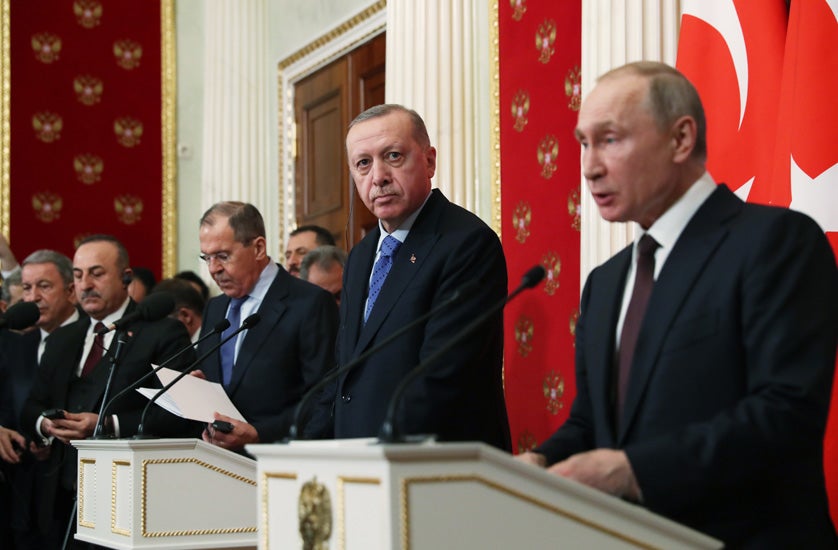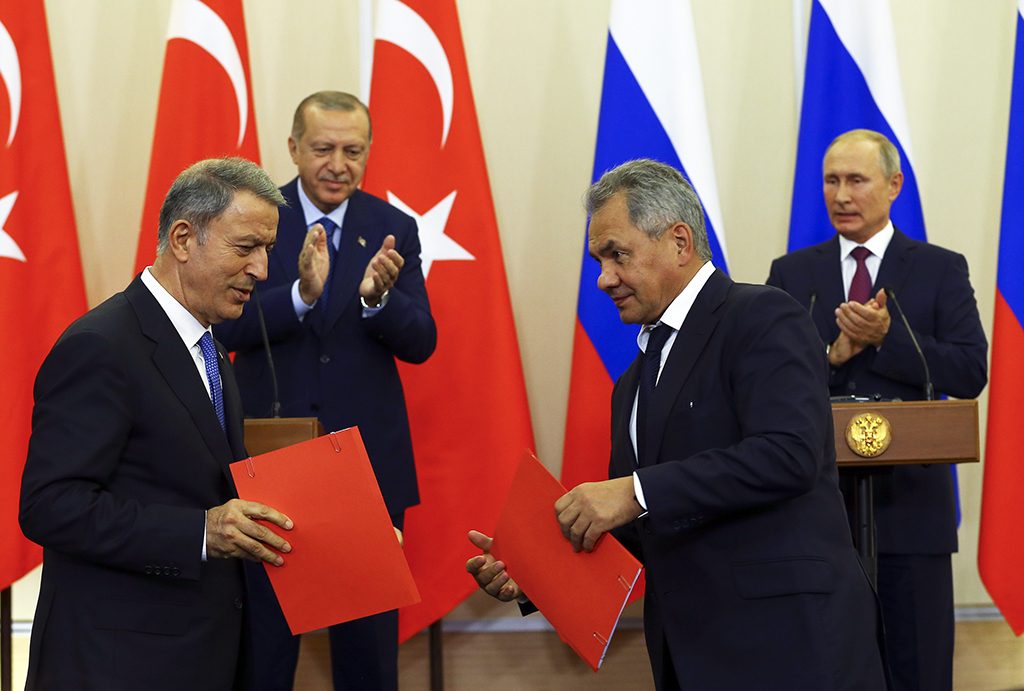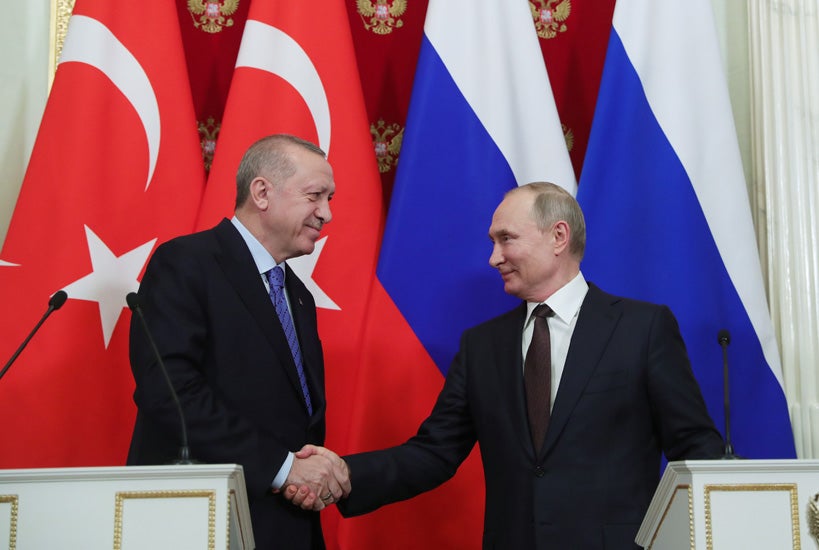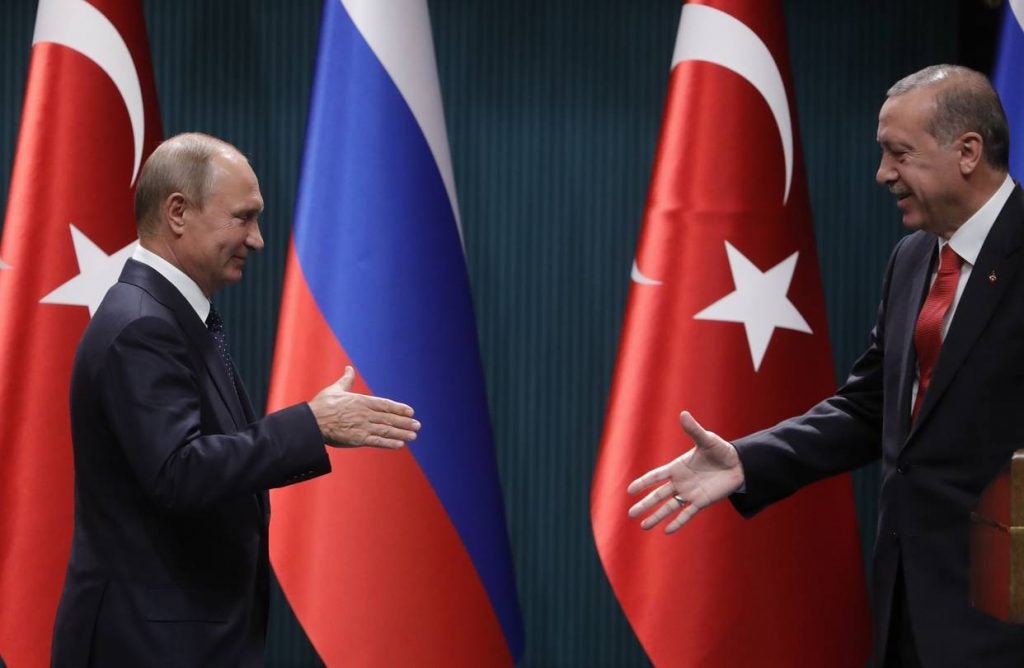Escalation & Deescalation Between Russia and Turkey
Idlib Strains Russia and Turkey’s Relationship
The recent military escalation at Idlib region of Syria challenges relations between Russia and Turkey. Since the end of February intense engagements have occured between the Syrian Army (SAA) and Turkish and Turkish-backed opposition forces. At this stage there a de-facto state of war between Syria and Turkey.
On the 5th March, Turkish President Recep Tayyip Erdoğan, Turkish Minister of Foreign Affairs Mevlüt Çavuşoğlu, Turkish Minister of Treasury and Finance Berat Albayrak and the President of Turkish National Intelligence Service Hakan Fidan conducted an official visit to Kremlin to reach a consensus and stop the military escalation in the region.

The Situation in Idlib
The province of Idlib probably represents the final stage of the Syrian Civil War and it has become a serious problem for Russia and Turkey. Both states have been developing good relations since 2010 and the states define each other as ‘strategic partners’. In 2018, Turkey and Russia agreed on the S-400 air defense missile systems sales deal, this was a controversial arms deal in the context of Turkey’s position within NATO. As a result of the deal, Turkey was removed from the F-35 fighter jet program and sanctioned by the US. These actions pushed Turkey to get closer and construct a stronger relationship with Russia. Despite the good relations between Russia and Turkey, the situation in Syria has never been a part of the ‘strategic partnership’ because of the opposite positions both states have. There have been several attempts to reach an agreement, including the ‘Astana Process’, but all of these efforts were temporary and Idlib has always remained an issue.
Since Turkey intervened directly in the region (as previously reported by Overt Defense) and as a result positioned its forces in close proximity to Russian-backed Syrian government forces. Each day engagements occur between both sides and the region is highly tense. Russian support is not only limited to intelligence and planning but they are also then Syria’s main source of arms and munitions. The Russian Air Force has also directly joined operations with Assad forces and most of the critical are strikes conducted by them.
A recent statement on the situation in Idlib from the Turkish Minister of National Defense states:
“The Regime soldiers and units are the ones that attack our troops.
Turkish Minister of National Defense Hulusi Akar’s statement on the situation in Idlib. (04.03.2020)
Our expectation from the Russian Federation is that as the guarantor country it fulfills its commitments and, in this context, use their influence on the regime to stop its attacks and comply with the Sochi Consensus borders.”
The progress of Assad’s forces depends on Russian air support, in other words, Russia holds the operational key. Politically, all parties on the ground intend to keep diplomatic channels open. Giving up on diplomacy may lead to a process that results in a major inter-state conflict. Russia is not decreasing its military presence in the region and insists on a rigid diplomatic manner. Turkey is acting patiently and hopes for some satisfactory outcomes via diplomacy but also implies that if the diplomacy comes to a dead-end the result they won’t back down on the ground. Turkey’s aim is the implementation of the Sochi Agreement.

Sochi Agreement
The Sochi Agreement, also known as Memorandum on Idlib, was signed in 2018, by Russia, Turkey, and Iran. The purpose of the agreement was to create a safe zone around Idlib and protect the area from terrorist groups. According to the agreement, no party can conduct attacks on the region. The problem here is the failure of the disarmament process of some groups. Because of this reason Russia claimed that the agreement has been violated giving them the necessary excuse to conduct military operations to the region.

The 5th March Memorandum
As of 5th March, two states have reached an agreement on the Idlib issue. The terms of the memorandum are:
- Ceasefire as of 00:01 of March 6, 2020.
- Establishment of a security corridor 6km north and south of M4 Highway.
- Joint Turkish-Russian patrols along M4 from Trumba to Ain-Al-Havr to commence 15.03.2020.
Gülnur Aybet – the Senior Advisor to the President of the Republic of Turkey
Both sides have agreed to prevent further deterioration of the humanitarian situation, ensure humanitarian assistance to all Syrians in need without preconditions and discrimination. The leaders also implied that they both agreed on the prevention of the displacement of people and the facilitation of safe and voluntary return of refugees and internally displaced persons to their original places of residence in Syria.
One of the most important highlights from the press release on the meeting was that both leaders agreed that there was no military solution to the Syrian conflict and that it can be only resolved through Syrian-led and UN-facilitated political processes in line with the United Nations Security Council Resolution 2254. The coming days will show us if the latest memorandum between Russia and Turkey will be a solution to the issues in the region or not.

